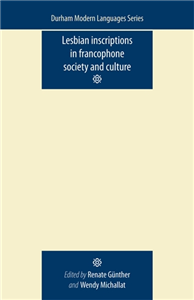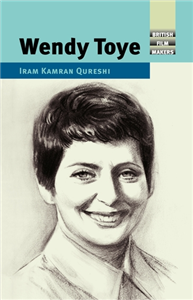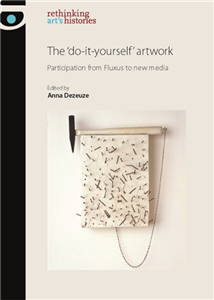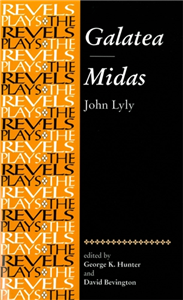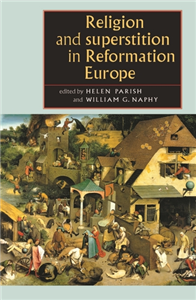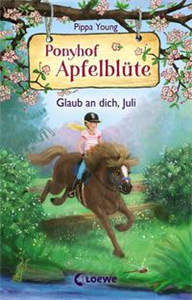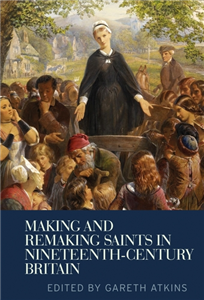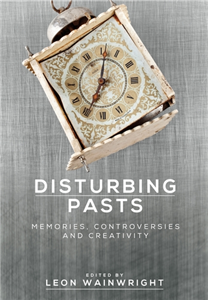Your Search Results
-
Promoted ContentLiterature & Literary StudiesOctober 2012
Lesbian Inscriptions in Francophone Society and Culture
by Edited by Renante Güntner and Wendy Michallat
This book represents the first comprehensive collection of essays in English dedicated entirely to the study of lesbian inscriptions in francophone society and culture. Spanning the period from the early nineteenth to the twenty-first century, the volume offers a range of interdisciplinary perspectives on ways in which lesbianism has been represented and represented itself, with essays on poetry and the novel, contemporary film and television, photography and architecture. These essays will appeal to students and scholars of gender studies and French literature and culture. ;
-
Promoted ContentThe ArtsJanuary 2026
Wendy Toye
by Iram Kamran Qureshi
This groundbreaking book delves into the remarkable career of Wendy Toye, one of Britain's most prolific, versatile and pioneering directors. Spanning a fascinating journey through her work in cinema, television, and advertising, the study highlights her mastery of visual storytelling, choreographic brilliance, and technical innovation. From her landmark short film The Stranger Left No Card to her contributions in musicals, comedy, fantasy films, and television productions, Toye's work consistently broke boundaries in a male-dominated industry. This insightful analysis also examines her ability to combine artistry with precision, her influence on the postwar cultural landscape, and her lasting legacy as a multidimensional creative force. A must-read for cinema enthusiasts, scholars, and anyone inspired by women's achievements in the media landscape.
-
 Trusted Partner
Trusted Partner
-
 Trusted Partner
Trusted Partner
-
 Trusted Partner
Film theory & criticismFebruary 2014
Trusted Partner
Film theory & criticismFebruary 2014The Encyclopedia of British Film
Fourth edition
by Edited by Brian McFarlane
With well over 6,300 articles, including over 500 new entries, this fourth edition of The Encyclopedia of British Film is a fully updated invaluable reference guide to the British film industry. It is the most authoritative volume yet, stretching from the inception of the industry to the present day, with detailed listings of the producers, directors, actors and studios behind a century or so of great British cinema. Brian McFarlane's meticulously researched guide is the definitive companion for anyone interested in the world of film. Previous editions have sold many thousands of copies and this fourth edition will be an essential work of reference for enthusiasts interested in the history of British cinema, and for universities and libraries.
-
 Trusted Partner
Humanities & Social SciencesNovember 2007
Trusted Partner
Humanities & Social SciencesNovember 2007Videogame, player, text
by Edited by Barry Atkins and Tanya Krzywinska
-
 Trusted Partner
September 2023
Trusted Partner
September 2023Nihilistische Zeiten
Denken mit Max Weber
by Wendy Brown, Christine Pries
Warum ist die Politik heute ein Laufsteg eitler Demagogen und die Universität ein ideologischer Kampfplatz? Und was ist dabei aus der Wahrheit geworden? In ihrem neuen Buch entdeckt Wendy Brown den modernen Nihilismus als Ursache dieser Probleme: Er entzieht allen Werten einschließlich der Wahrheit die Grundlage; er hyperpolitisiert das Wissen und reduziert die politische Sphäre auf die Zurschaustellung von Narzissmus. Der Nihilismus macht das Tiefgründige trivial, die Zukunft egal und die Korruption banal. Auf der Suche nach Lösungen wendet sich Brown Max Webers berühmten Vorlesungen über Wissenschaft und Politik als Beruf zu, die dieser am Ende des Ersten Weltkriegs hielt. Darin beklagt nämlich schon Weber selbst die Auswirkungen des Nihilismus auf das wissenschaftliche und politische Leben in der Moderne und fordert eine Wiederherstellung der Wahrheit in der Wissenschaft und der Integrität in der Politik. Im Anschluss an Weber plädiert Brown dafür, das Wissen aus der Hyperpolitisierung zu befreien, und denkt über neue Wege verantwortlichen politischen Handelns nach. Vor allem aber fordert sie die Linke auf, ihrer Verpflichtung zu kritischem Denken gerecht zu werden, und entwirft eine radikaldemokratische Vision, die eine charismatische Führung nicht scheut.
-
 Trusted Partner
Political structure & processesMay 2007
Trusted Partner
Political structure & processesMay 2007Devolution and constitutional change in Northern Ireland
by Edited by Paul Carmichael, Colin Knox and Robert Osborne
This edited book, written by a collection of scholars with an interest in Northern Ireland, tracks its uneasy experience with devolution following the optimistic political period associated with the 1998 Belfast (Good Friday) Agreement. The volume brings together researchers from the Economic and Social Research Council's (ESRC) 'Devolution and Constitutional Change' Programme and other experts to record four key perspectives on Northern Ireland. First, it considers the inextricable link between devolution and constitutional developments. Second, it examines how the main political parties responded to devolution and the major challenges faced by society in moving beyond conflict (such as political symbolism, the role of women, equality and human rights issues). Third, it attempts to assess some of the workings of devolved government in its short-lived form or those seeded in devolution and carried on by direct rule ministers. Finally, Northern Irelands devolved government and associated institutions are located within the wider relationships with Westminster, the Republic of Ireland and Europe. This edited volume will be of interest to students of Irish politics and public policy, but more generally, from a comparative perspective, those with an interest in devolution and constitutional change. It may even assist politicians in Northern Ireland to reflect on the real potential to restore its devolved institutions and draw back from the brink of permanently copper-fastening 'direct rule' from Westminster.
-
 Trusted Partner
Sociology: work & labourJuly 2015
Trusted Partner
Sociology: work & labourJuly 2015The sociology of unemployment
by Edited by Tom Boland and Ray Griffin
The sociology of unemployment is an analysis of the experience and governance of unemployment. By considering unemployment as more than just the absence of work; the book explores unemployment as a distinctive experience created by the welfare state. Each chapter explores an aspect of the experience or governance of unemployment; beginning with how people talk about their experience of being unemployed individually and collectively, to the places of unemployment, and on to the processes, policies and forms of the social welfare system. Clear explanations of classic theories are explored and extended, all against the backdrop of new primary research. Chapter by chapter, The sociology of unemployment challenges the 'deprivation theory of unemployment' which dominates sociology, psychology and social policy, by focusing on how governmental power forms the experience of unemployment. As a result, the book is both an introductory text on the sociology of unemployment and a fresh, critical perspective.
-
 Trusted Partner
Non-graphic art formsMay 2012
Trusted Partner
Non-graphic art formsMay 2012The 'do-it-yourself' artwork
Participation from Fluxus to New Media
by Edited by Anna Dezeuze
Viewers of contemporary art are often invited to involve themselves actively in artworks, by entering installations, touching objects, performing instructions or clicking on interactive websites. Why have artists sought to engage spectators in these new forms of participation? In what ways does active participation affect the viewer's experience and the status of the artwork? Spanning a range of practices including kinetic art, happenings, environments, performance, installations, relational and new media art from the 1950s to the present, this critical anthology sheds light on the history and specificity of artworks that only come to life when you - the viewer - are invited to 'do it yourself.' Rather than a specialist topic in the history of twentieth- and twenty-first century art, the 'do-it-yourself' artwork raises broader issues concerning the role of the viewer in art, the status of the artwork and the socio-political relations between art and its contexts.
-
 Trusted Partner
Plays, playscriptsNovember 2016
Trusted Partner
Plays, playscriptsNovember 2016The Tragedy of Antigone, The Theban Princesse
by Thomas May
by Edited by Matteo Pangallo. Series edited by Paul Dean
Thomas May's The Tragedy of Antigone (1631), edited by Matteo Pangallo, is the first English treatment of the story made famous by Sophocles. This edition contains a facsimile of the copy held at the Beinecke Library of Yale University, making the play commercially available for the first time since its original publication. The extensive introduction discusses, among other things, the ownership history of existing copies and their marginal annotations, and of the play's topical political implications in the light of May's wavering between royalist and republican sympathies. Writing during the contentious early years of Charles I's reign, May used Sophocles' Antigone to explore the problems of just rule and justified rebellion. He also went beyond the scope of the original, adding content from a wide range of other classical and contemporary plays, poems and other sources, including Shakespeare's Romeo and Juliet and Macbeth. This volume will be essential reading for advanced students, researchers and teachers of early English drama and seventeenth-century political history.
-
 Trusted Partner
Plays, playscriptsJanuary 2007
Trusted Partner
Plays, playscriptsJanuary 2007Galatea and midas
John Lyly
by Edited by George Hunter and David Bevington
Galatea and Midas are two of John Lyly's most engaging plays. Lyly took up the story of two young women, Galatea (or Gallathea) and Phillida who are dressed up in male clothes by their fathers so that they can avoid the requirement of the god Neptune that every year 'the fairest and chastest virgin in all the country' be sacrificed to a sea-monster. Hiding together in the forest, the two maidens fall in love, each supposing the other to be a young man. Galatea has become the subject of considerable feminist critical study in recent years. Midas (1590) uses mythology in quite a different way, dramatising two stories about King Midas in such a way as to fashion a satire of King Philip of Spain (and of any tyrant like him) for colossal greediness and folly. In the wake of the defeat of Philip's Armada fleet and its attempted invasion of England in 1588, this satire was calculated to win the approval of Queen Elizabeth and her court.
-
 Trusted Partner
Literary studies: c 1500 to c 1800November 2011
Trusted Partner
Literary studies: c 1500 to c 1800November 2011The Humorous Magistrate (Arbury)
by Edited by Margaret Jane Kidnie
The Humorous Magistrate is a seventeenth-century satiric comedy extant in two highly distinctive manuscripts. This, the earliest and clearly working draft of the play is bound with three other plays (including The Emperor's Favourite, published by the Malone Society in 2010) in a volume in the library of the Newdigate family of Arbury Hall, Nuneaton, Warwickshire. The second version, showing yet another stage of revision not found in the Arbury manuscript and orientated towards performance, was purchased by the University of Calgary from the English antiquarian Edgar Osborne in 1972. The relationship between the manuscripts was discovered in 2005. The anonymous play has been attributed to John Newdigate III (1600-1642). Like The Emperor's Favourite, it takes aim at the court; its particular object of satire is governmental strategies under the Personal Rule of Charles I. The play appears in print for the first time in these separate editions. The volumes are illustrated with several plates, some provided for comparative purposes.
-
 Trusted Partner
European historyJanuary 2003
Trusted Partner
European historyJanuary 2003Religion and superstition in Reformation Europe
by Edited by Christopher Durston and Judith Maltby
What, in the sixteenth and seventeenth centuries, was 'superstition'? Where might it be found, and how might it be countered? How was the term used, and how effective a weapon was it in the assault on traditional religion?. The ease with which accusations of 'superstition' slipped into the language of Reformation debate has ensured that one of the most fought over terms in the history of early modern popular culture, especially religious culture, is also one of the most difficult to define. Offers a novel approach to the issue, based upon national and regional studies, and examinations of attitudes to prophets, ghosts, saints and demonology, alongside an analysis of Catholic responses to the Reformation and the apparent presence of 'superstition' in the reformed churches. Challenges the assumptions that Catholic piety was innately superstitious, while Protestantism was rational, and suggests that the early modern concept of 'superstition' needs more careful treatment by historians. Demands that the terminology and presuppositions of historical discourse on the Reformation be altered to remove lingering sectarian polemic.
-
 Trusted Partner
Literature: history & criticismFebruary 2017
Trusted Partner
Literature: history & criticismFebruary 2017The Gothic and death
by Series edited by Elisabeth Bronfen. Edited by Carol Davison
The Gothic and death offers the first ever published study devoted to the subject of the Gothic and death across the centuries. It investigates how the multifarious strands of the Gothic and the concepts of death, dying, mourning and memorialisation ('the Death Question') - have intersected and been configured cross-culturally to diverse ends from the mid-eighteenth century to the present day. Drawing on recent scholarship in such fields as Gothic Studies, film theory, Women's and Gender Studies and Thanatology Studies, this interdisciplinary collection of fifteen essays by international scholars combines an attention to socio-historical and cultural contexts with a rigorous close reading of works, both classic and lesser known. This area of enquiry is considered by way of such popular and uncanny figures as corpses, ghosts, zombies and vampires, and across various cultural and literary forms such as Graveyard Poetry, Romantic poetry, Victorian literature, nineteenth-century Italian and Russian literature, Anglo-American film and television, contemporary Young Adult fiction and Bollywood film noir.
-
 Trusted Partner
Humanities & Social SciencesMay 2017
Trusted Partner
Humanities & Social SciencesMay 2017Reframing health and health policy in Ireland
A governmental analysis
by Edited by Claire Edwards, Eluska Fernandez
This edited collection is the first to apply the theoretical lens of post-Foucauldian governmentality to an analysis of health problems, practices, and policy in Ireland. Drawing on empirical examples related to childhood, obesity, mental health, smoking, ageing and others, the collection explores how specific health issues have been constructed as problematic and in need of intervention in the Irish State, and considers the strategies, discourses and technologies involved in the art of governing health in advanced liberal democracies. Bringing together academics from social policy, sociology, political science and public health, the text seeks to develop a dialogue about both the nature of health and health policy in the Ireland, but also how governmentality, as a theoretical approach, can contribute to the development of critical health policy analysis.
-
 Trusted Partner
Political partiesMay 2005
Trusted Partner
Political partiesMay 2005Political marketing
A comparative perspective
by Edited by Darren Lilleker and Jennifer Lees-Marshment
Political marketing has become a global phenomenon as parties try to copy the market-oriented approach employed by Tony Blair to win power for New Labour in 1997. Increasingly voters choose parties like consumers choose products, and this study looks at how some political parties, such as Sinn Fein, have been able to capitalise on this to gain support. It raises fresh perspectives on the more established political marketing practices in the UK and US, such as how to incorporate political leadership within the market-oriented framework and the democratic implications when faced with the actually business of governing. This book also highlights how the market-oriented party approach has spread around the world, including Europe and the new democracies of Brazil and Peru. The chapters, in demonstrating this convergence in practices, also question whether this strategy is appropriate for political systems based on proportional representation and coalition governments such as those in Austria, Germany, New Zealand, Canada, and devolved systems in Northern Ireland and Scotland. The collection also introduces the debate on whether such practices enhance or undermine democracy, raising important questions on the future of political marketing. This book should become an established essential text for students and academics of political science and marketing.
-
 Trusted Partner
February 2020
Trusted Partner
February 2020Ponyhof Apfelblüte (Band 15) - Glaub an dich, Juli
Pferdebuch für Kinder ab 8 Jahren zum Vorlesen und Selberlesen - Das perfekte Geschenk für alle Pferdemädchen
by Pippa Young, Saeta Hernando, Sandra Margineanu
Auf dem Ponyhof Apfelblüte werden Träume wahr. Jedes Mädchen findet sein Lieblingspony, kann mit ihm schmusen, es striegeln und natürlich auf ihm reiten! Juli und ihr Pony Smartie sind ein fabelhaftes Team und verstehen sich blind. Kein Wunder, dass die zwei gemeinsam viele wichtige Turniere gewinnen. Doch bei einem Ausritt durch den Wald stürzt Juli auf einmal von Smartie. Ihre besten Freundinnen merken sofort, dass dieser Sturz Juli verändert hat. Wie können sie ihrer Freundin nur helfen?
-
 Trusted Partner
History of religionJuly 2016
Trusted Partner
History of religionJuly 2016Making and remaking saints in nineteenth-century Britain
by Edited by Gareth Atkins
This book examines the place of 'saints' and sanctity in a self-consciously modern age, and argues that Protestants were as fascinated by such figures as Catholics were. Long after the mechanisms of canonisation had disappeared, people continued not only to engage with the saints of the past but continued to make their own saints in all but name. Just as strikingly, it claims that devotional practices and language were not the property of orthodox Christians alone. Making and remaking saints in the nineteenth-century Britain explores for the first time how sainthood remained significant in this period both as an enduring institution and as a metaphor that could be transposed into unexpected contexts. Each of the chapters in this volume focuses on the reception of a particular individual or group, and together they will appeal to not only historians of religion, but those concerned with material culture, the cult of history, and with the reshaping of British identities in an age of faith and doubt.
-
 Trusted Partner
Museums & museologyNovember 2017
Trusted Partner
Museums & museologyNovember 2017Disturbing pasts
Memories, controversies and creativity
by Edited by Leon Wainwright




